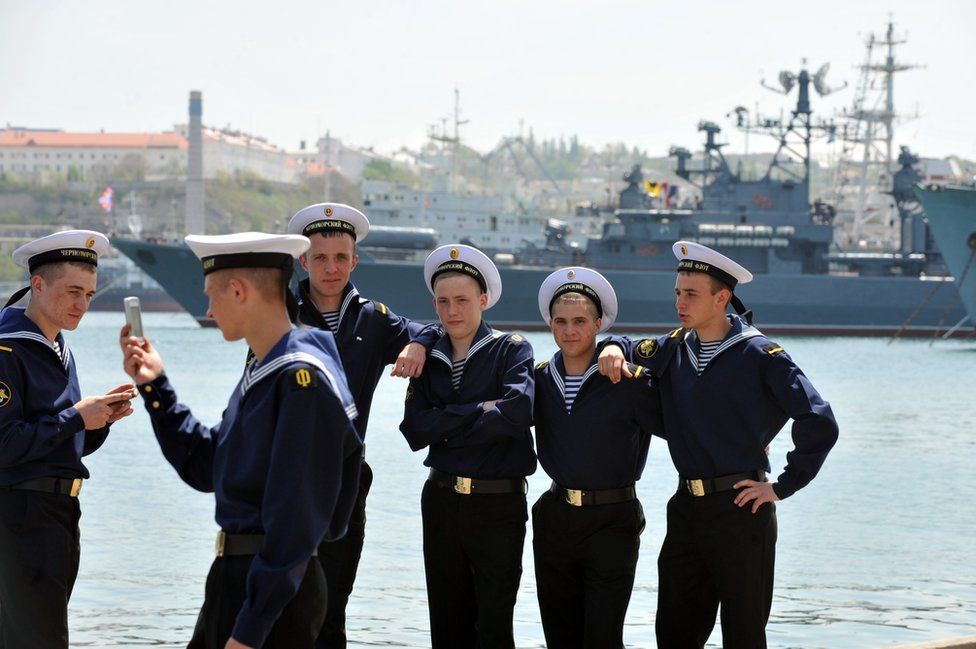Russian soldiers face ban on selfies and blog posts
- Published

The Russian defence ministry has drafted a law to ban social media posts by professional soldiers and other military personnel on security grounds.
The bill says photos, videos and other material uploaded to the internet can reveal military details useful to an enemy. Automatic geolocation can show where a military unit is deployed.
The bill affects "contract" soldiers, who can be sent abroad, not conscripts.
Russian soldiers' posts have revealed forces deployed to Ukraine and Syria.
For example, in July 2014 the BBC's Myroslava Petsa tweeted an image of a post by a Russian soldier who proudly reported delivering Grad rockets to the pro-Russian rebels in Ukraine.
Allow Twitter content?
This article contains content provided by Twitter. We ask for your permission before anything is loaded, as they may be using cookies and other technologies. You may want to read Twitter’s cookie policy, external and privacy policy, external before accepting. To view this content choose ‘accept and continue’.
Russia annexed Ukraine's Crimea peninsula in March 2014 and the following month the rebels seized a big swathe of Donetsk and Luhansk - mainly Russian-speaking regions in eastern Ukraine.
Ukraine and Western governments accuse Russia of supplying heavy weapons and troop reinforcements to the rebels. Russia admits that some Russian "volunteers" are helping the rebels, but denies sending regular forces.
In a YouTube video a reporter for Vice News, Simon Ostrovsky, revealed how a Russian soldier's social media posts had enabled him to confirm the Russian military's direct role in the eastern Ukraine fighting.
In August 2014 an article by the Bellingcat investigative team said social media posts by Russian soldiers had confirmed deaths among members of Russia's 76th Airborne regiment in eastern Ukraine. The regiment is based in Pskov, western Russia.
Bellingcat specialises in analysis of social media to document conflicts, including Russia's military role in Syria.
So-called Islamic State (IS) runs a sophisticated social media operation. The jihadists are fighting not only the US-led coalition in Iraq and Syria, but also the Russian forces allied with Syrian government troops.
Read more on this topic:
The Russian defence ministry says two state security bodies - the FSB and FSO - already ban their staff from posting social media content about themselves or their work.
The new ban affecting armed forces personnel is expected to take effect in January 2018, Tass news agency reports.
What selfies reveal
By BBC Technology reporter Chris Foxx
All the major social networks let people share their location when they post photos and messages online.
This can help people find content from a given location, for example the Eiffel Tower in Paris.
Smartphone location data can be very accurate - to within a few metres - and some social networks let you make very specific searches.
It is all too easy to send a tweet without realising location-sharing is switched on, and that could reveal the exact location of troops.
Many people do not realise that photos taken with a smartphone's default camera app often carry embedded location data too.
And of course, a plain old selfie could reveal your location to somebody who recognises what is in the background.
Ukraine's military is also concerned about its soldiers revealing too much on social media.
The Kyiv Post reported those concerns in 2015, when the fighting with pro-Russian rebels was more intense.
"There have been cases where positions were revealed, which led to active shelling," said Dmytro Podvorchansky of Ukraine's Dnipro-1 Regiment.
- Published24 July 2017
- Published9 September 2015
- Published10 March 2015
- Published28 August 2014
- Published27 August 2014
- Published25 July 2014